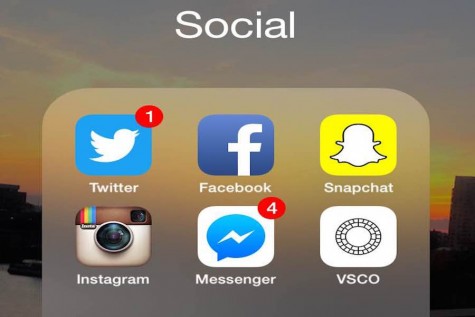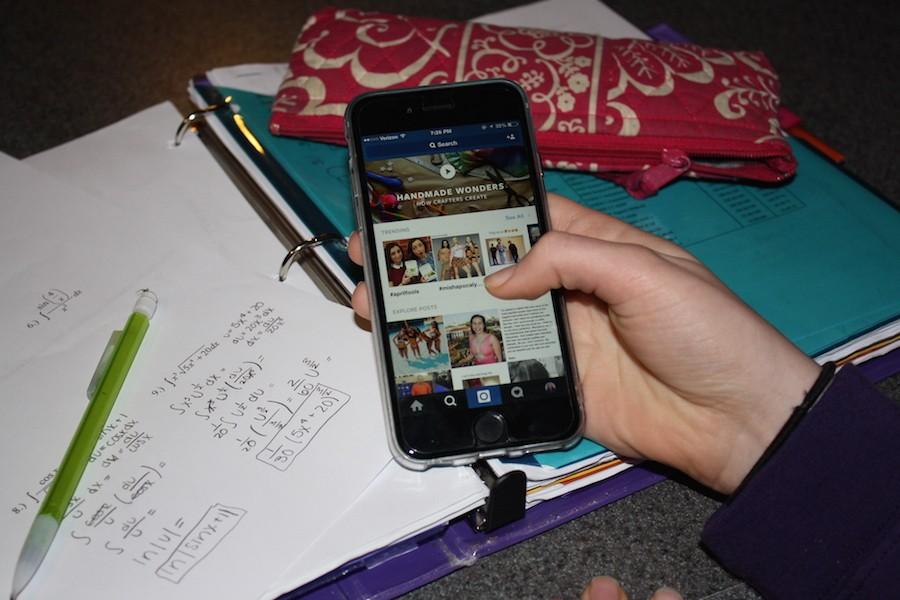Social media linked to low self esteem
April 3, 2016
Teenagers today are constantly connecting through various social media outlets including Facebook, Instagram, Twitter, and Snapchat. Social media can benefit adolescents by enhancing communication and enabling them to make social connections. However, there are some downsides to social media.
In a recent study completed by Pew Research Center where over 1,000 teenagers ages 13 to 17 were surveyed, it was revealed that 92 percent of teens reported going online daily. Of this 92 percent, 24 percent claimed they are online “almost constantly,” and 56 percent checked social media several times per day. The survey also showed that 71 percent of teens use more than one social media network.
With frequent exposure to social media outlets, it is easy for teens to get caught up in this form of communication and self expression.
However, social media can be a dangerous thing because once a person posts something or comments on a status, it is there forever.
“Things just last longer. People do and say things without thinking them through and it doesn’t go away,” said guidance counselor Heidi Hider.

Recent studies have linked frequent social media usage with lowered self-esteem and depression. Teens tend to pay attention to how many likes they are getting in comparison to their peers. When they do not get as many likes as everyone else, it can affect their confidence and cause them to compare themselves to others.
A recent survey found that the more time people spend on social media sites, the more susceptible they are to becoming depressed. By comparing themselves to their Facebook friends or people they follow on Instagram, people may experience feelings of envy and their self esteem can be impacted, and in some cases, may make them more susceptible to depression.
Though she does not feel that social media usage can cause depression, Hider feels that it could exacerbate feelings of depression for some teens who are already depressed.
“I think it is probably more that people who are already depressed are going to isolate themselves more with social media and use it as their means of interacting with people,” said Hider.
Along with teens worrying about their number of followers and likes, they also fear missing out on what fun and exciting things other people are doing. When scrolling through Instagram or Facebook, a person’s feed is usually filled with pictures of interesting things that other people are doing.
Health teacher Melanie Jozokos has noticed a trend in social media and a lack of self esteem due to the fear of missing out.
“I was recently introduced to the acronym FOMO (fear of missing out) […] It totally makes sense to me that people, students in particular, feel they are missing out. They are constantly on their phones….checking for updates, checking to see who texted them, checking other people’s status,” said Jozokos. “Because of this, I think they are always comparing themselves to others.”
Guidance counselor Tracy McLaughlin has seen students comparing themselves to others on social media, even throughout the college process.
“Even through the whole college process, the seniors are posting where they have gotten into school and everyone is expecting you to post where you’re going, so there is a lot of pressure,” said McLaughlin. “When other people are talking about all of the things that are wonderful in their life even though they have bad things too, a lot of people feel like ‘what’s wrong with me’ because people are posting all of this positive stuff and I have all of this negative stuff going on.”
Social media often only shows the happy and exciting times in a person’s life and they tend to only demonstrate the best version of themselves. When others only see the good times in people’s lives based on their social media accounts, they can feel like it is not normal to experience some difficult and not so positive times in their life.
“Unfortunately people only usually post the good things that are happening to them so others don’t see the ‘downs’ in life, which can be very normal. Then people think they are not ‘normal’ when they are feeling down,” said Jozokos.

A recent example of how social media can hide the truth of what a person is actually going through is the story of Madison Holleran, a track star at the University of Pennsylvania who committed suicide after struggling with depression, despite what her Instagram profile showed. Holleran’s Instagram profile displays pictures of her smiling with friends and put out the illusion that she was living a happy life. In reality, however, she was severely depressed.
Holleran’s story is just one example of how a person’s social media presence can make them seem like only positive things are happening to them, but in reality, it is all a facade.
With more and more teenagers using social media as a way to post photos and present the best versions of themselves to the rest of the online community, it can be difficult for teenagers not to compare themselves to others and let their self-esteem be affected. Although social media is a great way to communicate with others and share ideas, research shows that excessive social media usage may be linked to lowered self esteem.
